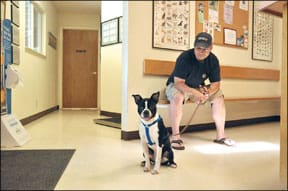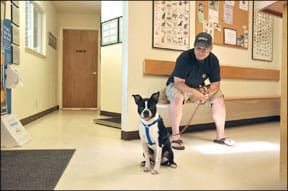It’s awkward at best, devastating at worst, when your trainer or other animal care professional wants to do – or actually does – something to your dog that goes against your strongly held beliefs about how dogs should be treated. This is most often something involving the use of coercion or force, but also includes other things, such as feeding something you don’t want your dog to ingest, and reinforcing a behavior you don’t want rewarded. Professionals, at least good ones, are supposed to be well-educated and know what they’re doing. Who are you to object?

288
Actually, you’re the only one who can object. You are your dog’s protector, that’s who, and he depends on you to do what’s right for him.
So what do you do when your trainer, veterinarian, groomer, or other professional starts to do something you find disturbing?
-Intervene. You have the absolute right – no, the moral obligation and duty – to stop someone from doing something inappropriate to your dog. It doesn’t matter who they are, or how many letters they have after their name. Be assertive. In a loud, clear, firm voice, say, “Stop!” Then calmly take your dog from the person and keep him with you while you and the person discuss the situation, and your concerns. A true professional will respect you for standing up for your dog’s best interests, even if they disagree with the basis for your concern.
-Discuss. Do your professional the courtesy of discussing the situation with her. Calmly explain why you are uncomfortable with what she was doing, or about to do. Let her explain to you why feels she needs to do whatever it is. Listen to her explanation with an open mind. Ask if there are any alternative ways to accomplish the goal before you, and see if you can agree on a different approach. If so, be sure she is completely clear that she is not to use the tools or methods that you find objectionable.
-Think critically. As you listen and discuss, I suggest you use three filters to evaluate the information your trainer gives you about the tool or technique she wants to use that triggered your concern.
-Scientific filter: Does her explanation of the procedure or piece of equipment make sense?
-Philosophical filter: If something is scientifically sound but you’re not comfortable with it, don’t use it.
-The reality filter: Let’s say that after listening to your professional’s explanation, you decide that you’re comfortable proceeding. You can still stop the procedure at any time if you don’t like what you see, or even if you agree that it’s benign, but it doesn’t seem to be working. Each dog is different, and what works for one may not work for another, even if it’s philosophically acceptable.
When you’re done filtering, you can advance your status as a critical thinker by educating yourself further on the issue. Read books, join online discussion groups (whether it’s about training based on positive reinforcement, natural diet, or holistic healthcare) and consult with other professionals whose perspectives you respect.
-Trust your instincts. Don’t let your animal care professional make light of your concerns, or talk you into something you don’t want to do. Trust your instincts. Countless dog owners tell me they regret succumbing to pressure and letting a trainer, vet, or other professional convince them to allow them to use a tool or method that they objected to. Still others regret not speaking up at all, until it was too late. Stand firm. You are your dog’s protector.
-Walk away. If you and your professional can’t find a compromise, or you don’t think she can be trusted to respect your feelings and beliefs, fire her. You can do it nicely; just calmly explain that you feel the two of you are philosophically too far apart, and that you need to find an animal care provider whose approach to training and handling is more closely aligned with yours. Then calmly walk away, forever your dog’s superhero, protector, and defender.
Pat Miller is WDJ’s Training Editor.






